Article published on November 7, 2021.
Surely it has already happened to you: you start the day calmly and have a medical examination scheduled for 1:30 pm. So have you time ahead of you to do so many other things in the meantime, right?
except you’re here unable to do anythingexcept maybe scrolling through Instagram and thinking about when you’ll have to put your coat on to go to that famous date.
Personally, this happens to me regularly and until recently I wear it for a clever mix of laziness and fatigue. And I was wrong.
This is what I realized when I discovered this publication by illustrator Mikan Key:

” I learned of the term “waiting mode”. It was a problem that I have had since I was little and that I didn’t know was common enough in ADHD, people with OCD or generalized anxiety disorder, or even autism … after that if you have this “waiting problem” it is. fa does not necessarily mean you have one of these disorders. But if it hinders you, it is not to be overlooked! Maybe talk to your doctor or cut back!
This waiting mode or impulsiveness of waiting is the inability to do anything else before a date. It is characterized in me by the visceral fear of forgetting this appointment, tonight or of being late and therefore of mentally and instinctively planning a waiting time that often extends several hours before the appointment: there is a waiting mode. “
When you find yourself unable to accomplish even simple things in that amount of time before a deadline, it’s not laziness, or lack of effort or focus on your part.
Your brain has just entered what is called the standby mode.

The waiting mode, a phenomenon close to procrastination
Where does this blockade come from hopelessly to do something productive while we have time ahead of us?
Professional coach and trainer, Diane Ballonad Rolland specializes in time management and work-life balance. For her, the standby mode it is not that far from the phenomena of procrastination.
“Procrastination is a very complex and multifaceted phenomenon, there are many ways to procrastinate, it can be for fear of failure, for fear of the gaze of others.
The standby mode is a little different, but close. What paralyzes action, it is the mental place that occupies the deadline and who goes avoid having availability for something else. “
According to her, this psychological phenomenon is also a need to regain control of a situation that eludes us or whose outcome is uncertain:
“Our attention will be focused on the next event and it will be difficult to let go and focus on something else in the meantime. The more the event stresses us, the more energy it mobilizes, the more time we will need to prepare. ”
And it is all the more stressful when there is something at stake in this event, that it is a job interview Where is it a first Date.
On the blog linked to the Tiimo time management application, coach Maaya Hitomi remembers that the standby mode it can affect all kinds of people but will have a greater impact those who have attention deficit disorder with or without hyperactivity (ADHD), who are autistic, who suffer from depression or who suffer from anxiety.
“What paralyzes action is the mental place that the deadline occupies and that will prevent you from being available for something else. “
Some strategies to manage your waiting mode
Once we have more or less identified what triggers ours standby mode, what do we do ? True, we are also here to get out of this hellish circle of inertia.
The awareness can be a first step Once the risky situation has been identified, we can then better anticipate it, play it down and make sure we are not involved in the standby mode : “We can work on problems, in fact, take a certain distance so as not to get stuck, put things in perspective and not prevent ourselves from doing something else”explains Diane Ballonad Rolland.
Also advises to work what she calls “right action” :
“It’s about recognizing the right time to act. Blocking a niche, in which we know we can dedicate ourselves to a task, allows us to let ourselves go, to do things in due time. We know it will be done at the right time. “
Basically, make a plan, define specific and feasible tasks in the time available it will allow me not to find myself helpless and undecided between different things to do e in the end do not do any when I have the time.
Diane Ballonad Rolland rightly remembers the distinction between Chrono And Kairostwo definitions of time, the first linear, the second linked to the idea of opportunity.
“Right action is also knowing when to stop and do nothing. It is also important. We don’t always need to make our brain time profitable. “
Give yourself the right to do nothing
It’s always nice to say: we have the right to do nothingand above all, we are right not to be productive 100% of our time.
Rightly remember the need to do this let our brain breathe and that the illusion of doing nothing also allows our food to rely on the classification and reorganization of information: “It’s also time to daydream, we need it. ”
what else get out of guilt that we carry around when we don’t ” nothing “. Sometimes that’s when we do let our mind wander aimlessly that a good idea is born.
Maaya Itomi also offers simple strategies to implement: practice the mental dumpin other words clear your mind by writing down your thoughts around that deadline, without necessarily listing them immediately or setting a timetable.
Also, and this may seem obvious, but relying on an alarm to signal the moment where you need to prepare for your deadline, then a second for when you really need to leave (or connect), can help, explains Maaya Itomi:
“To give these reminders the best chance of working, we have to force them into our consciousness. This can mean setting multiple alarms to have more opportunities to free yourself from the task at hand, using alarms you need to disable, or outsourcing the reminder by asking someone who has a better relationship with time (especially if they accompany us). “
As Mikan Key also explains, you can also schedule as many appointments as possible at the start of the day to avoid standby mode which could happen several hours before.
Of course, each person experiences stress differently and will have their own solution. It is up to you to test yourself, to experience what you think is best suited to overcome the standby mode.
Yes, we can act on this mechanism, believes Diane Ballonad Rolland, and we must not hesitate to turn to psychological help as well. in cases where this phenomenon becomes really problematic : “Where you have to worry is when it becomes paralyzing, when you can’t do anything else, including everyday things. ”
And you, you too are a victim of standby mode ? Do you have any means of escaping it?
Photo credit: Quốc Bảo via Pexels
Source: Madmoizelle
Ashley Root is an author and celebrity journalist who writes for The Fashion Vibes. With a keen eye for all things celebrity, Ashley is always up-to-date on the latest gossip and trends in the world of entertainment.




